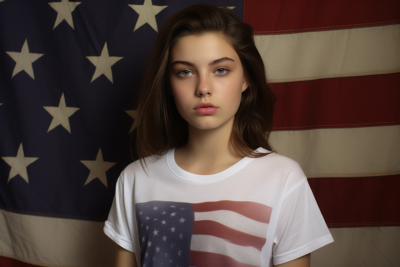Can You Wear Political Shirts to School?

Political shirts are clothing items that feature logos, slogans, or images related to a particular political cause. They can be anything from an image of the president to an anti-war slogan. Wearing these shirts is often seen as a form of free speech and expression, and they have become increasingly popular in recent years with more people choosing to express their views through their clothing choices.
Political shirts come in various colors, styles, and sizes and usually feature bold graphics that make them stand out from other types of clothing. Some may also include words such as “vote” or “support” along with the name of the candidate or party being represented on the shirt. Other popular designs include flags representing different countries, symbols associated with certain causes (like climate change), and even quotes from famous speeches given by influential figures throughout history.
School Dress Code Policies on Wearing Political T-Shirts and Uniforms?
When it comes to the debate of whether or not students can wear political t-shirts to school, many schools have strict dress code policies that outline what is and isn’t allowed in terms of clothing. It’s important for students to understand their rights when it comes to expressing themselves through clothing at school.

In some cases, a student may be asked by their teacher or principal to remove any type of political statement shirt they are wearing if they deem it inappropriate. The reason behind this is usually because the message on the shirt could potentially offend other students or cause disruption within the classroom setting.
On the other hand, some states have laws that allow for certain types of political statements on shirts worn at school as long as there is no disruption caused by them.
For example, Massachusetts has a law stating that public schools must permit freedom of expression from its student body so long as there are no threats or disturbances made due to said expression.
Can a Student Wear a Political T-Shirt to Public Schools?
Public schools provide students with a platform to express themselves, and wearing political t-shirts is one of the ways for students to do that. However, in many cases, these shirts are not allowed due to school policies on clothing. Depending on the context and situation of each school, wearing a political shirt may be acceptable or prohibited.
In most public schools there are guidelines about what type of clothes can be worn by students. In some cases, this includes restrictions related to symbols or logos that could be considered offensive or controversial such as those associated with politics.
While free speech should always be encouraged, especially among young people who are still learning how their actions impact society at large; respect towards teachers and fellow classmates must also be taken into consideration before making any decisions regarding attire while attending classes.
Understanding the Law Basis: Can Political Shirts Violate School Dress Codes?
When it comes to wearing political shirts in school, the law is not always clear. Depending on your location and what type of shirt you choose to wear, you could be violating school dress codes or even federal laws. It’s important for students and parents alike to understand what can and cannot be worn in order for everyone to stay within their legal rights.
One way that a political shirt may violate school policy is if the content printed on the garment directly violates an existing rule from the institution itself. For example, many schools have regulations that prohibit clothing with profanity or obscene images.
Freedom of Expression vs. Dress Code Policies in Public Schools
When it comes to self-expression, some students may find wearing political shirts to be an effective way of conveying their views. However, many public schools have strict dress codes that limit what can and cannot be worn on school premises. While this is primarily done for safety reasons, it does raise the question of whether or not it infringes upon a student’s freedom of expression in terms of fashion choices.
Given the fact that most public schools are government institutions, there is also the issue of politics influencing education policies such as dress code regulations.
Can Public School Students Wear Political Shirts Despite a Ban?
Although public school students may want to express their political beliefs, many schools have implemented a ban on political shirts. This can be frustrating for those who wish to share their opinion with classmates or teachers. While it is possible that wearing these shirts could lead to disciplinary action, there are ways around this rule.
The most obvious solution would be to simply wear the shirt underneath another one, such as a sweatshirt or long-sleeved t-shirt.
Religious, Gender Identity, and Disruptive Apparel: Is it prohibited?
When discussing what is and isn’t allowed in terms of clothing for school, many people immediately think of political apparel. However, other types of attire may also be prohibited depending on the school’s dress code policy. These include religious garments or symbols, gender identity apparel such as a rainbow t-shirt or “They/Them” hoodie, and anything deemed disruptive to the educational environment.

Some schools may prohibit any outwardly expressed affiliation with religion while others may only ban displays that are seen as offensive or controversial by most people within their community. Similarly, certain schools might not allow students to wear clothing with words like “bisexual” or “queer” but would not necessarily stop someone from wearing a pink shirt to show support for LGBTQ+ rights.
Can You Wear Clothing that Can Discriminate Against Other People?
When it comes to wearing clothing that has political messages, there is an important factor to consider: can the message on the shirt discriminate against another person?
Wearing a political shirt that expresses your opinion about a certain topic might be fine, but if it says something offensive or derogatory toward another group of people then this could create a hostile environment for others.
In some cases, schools may even take action and discipline students who wear clothing with discriminatory messages. This means that even if you believe in what you are expressing on your shirt, you still need to be aware of how other people will perceive it.
Summary
In conclusion, wearing political shirts to public school can be a bit of a sticky wicket, as dress codes and students’ constitutional rights to freedom of speech intertwine. While school dress codes aim to maintain a positive classroom environment, the First Amendment rights of students can’t be tossed out the window.
Still, enforcement may differ from one school district to the next, and it’s essential to keep an open dialogue with school officials to ensure everyone’s rights are protected. So, whether you’re a boy or a girl looking to make a statement with your T-shirt or button, remember that your voice matters, but so does keeping the peace in the classroom. Expression at the schoolhouse gate is a right, but it’s important to tread carefully and respect the guidelines set forth by your school.

FAQs
Can students wear political T-shirts to public school without violating the dress code?
Well, it’s a bit of a mixed bag. While the Supreme Court has ruled in favor of students’ right to express their political opinions through attire, school dress codes may still impose some restrictions. It’s best to check with your school administrators to understand the specific dress code rules in your school.
How can wearing political attire to school protect a student’s rights?
Donning political T-shirts or buttons can be a way for students to call on their First Amendment rights, as long as it doesn’t disrupt the classroom environment. The Supreme Court case, Tinker v. Des Moines, set a precedent that allows students to express their opinions within reason, protecting them from unwarranted censorship.
What should I do if a teacher or school administrator asks me to remove my political T-shirt?
Keep calm and collected. It’s essential to have an open dialogue and understand their concerns. If you feel that your rights are being harshly infringed upon, consider seeking advice from the ACLU or another organization that supports students’ rights.
Can schools discriminate against students based on their political beliefs?
No way, Jose! Discrimination in education based on political beliefs is a big no-no in the U.S. While schools can enforce dress codes reasonably, they cannot directly target or censor students for expressing their political opinions through attire, as long as it doesn’t disrupt the educational environment.





